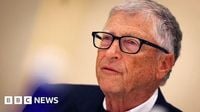Bill Gates has announced a monumental shift in his philanthropic strategy, pledging to donate 99% of his remaining fortune to the Gates Foundation, which will now close its doors in 2045, two decades sooner than previously planned. This decision, revealed in a blog post on May 8, 2025, marks a significant acceleration in his commitment to charitable giving, reflecting a sense of urgency to address pressing global issues.
Gates, who is currently 69 years old, estimates that his remaining wealth is around $107 billion. With this pledge, he aims to deliver an additional $200 billion to the foundation over the next 20 years, allowing it to maintain a budget of approximately $9 billion annually. This funding will support crucial initiatives in global health and education, particularly aimed at reducing childhood mortality and eradicating preventable diseases.
In his blog, Gates expressed a deep desire to ensure that his legacy is not defined by wealth accumulation. "People will say a lot of things about me when I die, but I am determined that 'he died rich' will not be one of them," he wrote, echoing sentiments from Andrew Carnegie's 1889 essay, "The Gospel of Wealth," which posits that the wealthy have a duty to return their fortunes to society.
The Gates Foundation, established in 2000, has been a leader in global philanthropy, distributing over $100 billion to various causes, including health initiatives and educational programs. Gates noted that the foundation’s most significant achievement has been the nearly 50% reduction in childhood deaths from preventable causes between 2000 and 2020, as reported by United Nations figures. However, he acknowledged that recent global trends, particularly in light of cuts to foreign aid, pose substantial challenges to sustaining this progress.
Gates' announcement comes amid growing concerns about the future of global health funding, particularly as the U.S. and other wealthy nations have begun to scale back their international aid budgets significantly. He highlighted the potential consequences of these cuts, stating, "It’s unclear whether the world’s richest countries will continue to stand up for its poorest people." He emphasized the need for continued partnership from governments to achieve the foundation's ambitious goals.
Among the foundation's primary objectives for the next two decades are the elimination of preventable deaths among mothers and children, the eradication of infectious diseases like malaria and measles, and lifting hundreds of millions out of poverty. Gates expressed optimism that these targets can be met, despite the current political and economic headwinds. "The world is in a moment where we are facing, literally, the toughest political and economic headwinds to our agenda since we were established," said Mark Suzman, CEO of the Gates Foundation.
Gates also addressed criticisms of his philanthropic model, which some argue grants excessive influence to wealthy individuals over global health policies. In response to these concerns, he stated, "Like any private citizen, I can choose how to spend the money I earn and have decided to do everything I can to reduce childhood deaths." He reaffirmed the foundation's commitment to its global health work, despite facing skepticism from various quarters.
In recent years, the foundation has faced additional challenges, including the departure of Melinda French Gates from its board following their divorce in 2021. French Gates has since focused on her own philanthropic efforts, emphasizing the need to address women’s rights and other critical issues. Gates acknowledged the impact of these changes on the foundation's governance but expressed confidence in the new board's ability to guide its future.
As the foundation prepares to spend down its endowment, Gates recognizes the importance of prioritizing its resources effectively. He remarked, "Having that time horizon and the resources just puts an even greater burden on us to say, 'Are you actually putting your resources on what are going to be the biggest, most successful bets rather than scattering it too thinly?'" This strategic focus will be crucial as the foundation navigates the complexities of global health and development challenges in the coming years.
Gates' commitment to philanthropy has been influenced by various personal experiences and mentors, including Warren Buffett, who has also pledged to give away the majority of his wealth. Together, they co-founded the Giving Pledge in 2010, which encourages billionaires to commit to donating the bulk of their fortunes during their lifetimes. This initiative has garnered over 240 signatories and has played a significant role in shaping contemporary philanthropic practices.
The foundation's announcement comes at a critical juncture in global health, particularly as the COVID-19 pandemic has exacerbated existing inequalities and disrupted health services worldwide. Gates emphasized the need for renewed commitment from both private and public sectors to address these issues, stating, "It’s incredible to come up with these low-cost things and tragic if we can’t get them out to everyone who needs them." He urged wealthy individuals to consider their role in supporting those in greatest need.
In conclusion, as the Gates Foundation embarks on its final two decades, it aims to leave a lasting impact on global health and development. Gates' pledge to donate the majority of his wealth reflects a broader shift in philanthropic norms, prioritizing immediate action over perpetuity. With ambitious goals and a renewed sense of urgency, the foundation seeks to address some of the world's most pressing challenges, ensuring that future generations can thrive.


